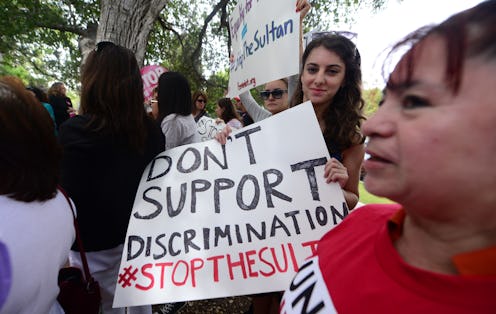
In order to combat the harassment and discrimination women often face in mixed-gender settings, women-only spaces have become popular. These places and events can lower the chances that women's voices will be drowned out by men's, as well as decrease the pressure to perform for the male gaze. But certain language and policies in women's spaces can unfortunately become exclusionary — and therefore, ironically, anti-feminist.
Spaces designated for women aren't inherently bad, but they do have a long history of being problematic. Take, for example, the controversy surrounding the Michigan Womyn’s Music Festival, which ran from 1976 through 2015: The festival faced accusations of being trans-exclusionary, in response to which founder and organizer Lisa Vogel wrote in an open letter in 2014. Although Vogel maintained in the letter that the festival's intention was "not a policy, or a ban on anyone" and stated that "trans womyn and transmen have always attended this gathering," she also wrote, "This space, for this week, is intended to be for womyn who were born female, raised as girls and who continue to identify as womyn."
Consider, too, that it's only recently that women's colleges in the United States have begun admitting trans women. Barnard College, the last of the Seven Sisters women's colleges to admit trans women, didn't make this change until 2015.
It's also worth noting in the discussion of women-only spaces that non-binary people — those who don't identify exclusively as men or women — are rarely mentioned. Even the names of these groups often reflect this. For example, while it was open to people of all genders, the recent Women's March on Washington's name suggested it was primarily for women. Language matters, and when it's not inclusive, it can ultimately have the effect of erasure.
Women-only spaces are intended to be safe — and in a world that's still rife with misogyny, it's easy to see why they might be appealing. But that doesn't prevent them from falling into anti-feminist traps, even unintentionally. Here's how that can happen — and how they can work to be better.
1By Equating "Women-Only" With "Feminine"
The purpose of designating a space only for women and/or other marginalized genders should be to help them overcome obstacles — not to limit someone to being able to access solely stereotypically "feminine" things (the sorts of things that our culture teaches us all women must necessarily like). Events with pink decorations, workspaces that assume women put higher value on work-life balance than men, and social groups exclusively centered on manicures and chick flicks only set women back. If you do like pink or chick flicks, then of course that's fine; the whole point is to have options. The problem only arises when pink and chick flicks are the only options presented.
2By Excluding Trans People
As I mentioned, some women-only spaces are either explicitly only open to cis women or use language that subtly excludes trans people. When feminists talk, for example, about "pussy power" or say women are strong because they can give birth or imply that all women have direct experience with periods or pregnancy, they send the message that only cis women are part of the conversation. Trans erasure is a major issue, and it can be either overt or subtle.
3By Excluding Non-Binary People
It might seem like women's spaces should by definition be only for women, but their purpose is to help people thrive in the face of sexism — and it's not just women who experience sexism. Non-binary and trans people do as well. The good news is that more and more safe spaces are coming to include non-binary people instead of being strictly for women.
4By Failing At Intersectionality
Women's spaces haven't only failed to include people of a variety of gender identities. They've also excluded people based on other criteria like race, social class, and ability. This also can result from our choice of language rather than being intentional. When we talk about patriarchy making women "crazy," we promote the use of a word that stigmatizes mental health problems. When we call people with opposing ideologies "old," we further ageism. And when we call them "stupid," we promote ableism. A movement can't help everyone who needs it unless they're all a part of it.